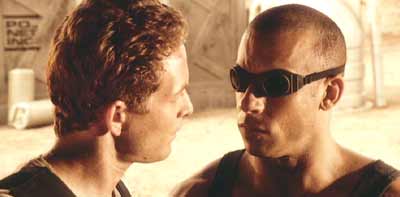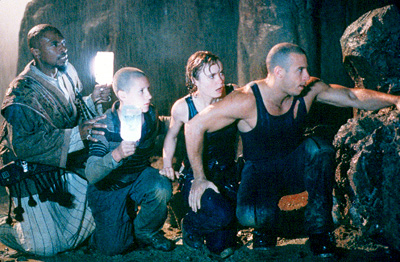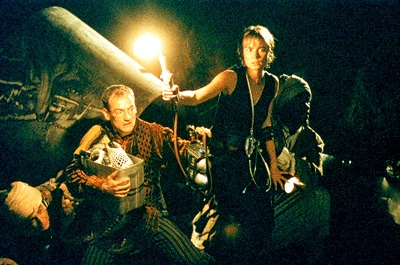
The next horror orientated post is a tribute to the show that made me fall in love with television, or at least marvel at how much it can do. Buffy The Vampire Slayer may not be the best show ever, but it sure was the most imaginative and when it got it right, well. Melts your face. So, without further ado.
Honourable mentions: Lover's Walk, The Wish, Innocence, The Gift, Chosen, Storyteller, School Hard, No Place Like Home, Who Are You?
10) Superstar, ( Season 4, Episode 19)

This episode is everything I love about Buffy The Vampire Slayer, granted its messy and perhaps judging stringently on quality there are better episodes, but none so thoroughly representative of everything the show did so wonderfully and innovatively right. Some backstory. This episode's protagonist Jonathan - imagine the nerdiest most pathetic being you can - began the show as an extra, a kid who almost died in season 2 episode 'Inca Mummy Girl', and whose survival was a punchline. A punchline so hilarious it lasted about 2 years, in which the fact that someone so inherently pathetic as Jonathan would continue to survive in this universe, brought many meta-chuckles to loyal fans. Some depth was finally brought to him in 'Earshot', but this episode was such a wonderful antithesis to a guy who existed to be laughed at by both the audience and the characters, pretty much a sight gag, and turn him into the most awesome guy in the universe was just inspired.
Our titular hero casts himself into an alternate world where he is a superhero, a millionaire and starred in The Matrix. In which he can do everything perfectly and everybody loves him, hell they even redesigned the credits to feature 100% more Jonathan, and its capped off by one of the best guest performances in the series run by Danny Strong. I think they lucked out that he was such a strong actor, because all he'd done previously to this was whimper in the corner. This is could have been an abysmal high-concept mess, but largely thanks to Strong, its one of the most fun hours the show ever produced. Innovative, hilarious and even a little affecting.
9) The Body ( Season 5, Episode 16)

The lowness of this positioning is probably heresy to the learned Buffy law, as laid down by a thousand terrifying Whedon fanatics, but fuck it. Here's the thing. The Body is undoubtedly a fantastic episode of television, its a calm meditation on death on a show that rarely slows down to stop, Its a wonderfully subtle example of just how thoughtful Buffy can be when it wants to be, something that often gets lost amongst tales of musicals and resurrections, to a level that almost exceeds any of its peers. Can you imagine Supernatural doing an episode like this, or Lost. Or anything? Why its not higher is that I would say that at times the acting doesn't match the writing, but its still a barn-stormingly revelatory episode of television in that its not afraid to be quiet. Because that only amplifies the despair.
8) Villains ( Season 6, Episode 20)

Season 6 of this show is something that everybody brings up when they mention bad seasons of great TV shows. It usually goes something along the lines of where's my mystical bad guy, where's my sense of fun, and why is Spike such a whiny bitch. Remember when he was a badass, coz I sure do. But in a way I'm tempted to say Season 6 is the bravest year of the show, far from the best obviously, any season that features the hideous 'Doublemeat Palace' can't claim anything of the sort. But its so balls out in its darkness, so unrelenting in breaking the camaraderie of our heroes, and sending them all of into spiralling pits of despair. A lot of it doesn't work, but when it did it was like nothing the show had done.
I'm tempted to say that Warren was the year's secret weapon, with a great slow burn performance by Adam Busch, as a villain who started out as light comic relief -as part of 'The trio' three nerds who band together to be supervillains - when the darker stuff was all Buffy's internal struggle and shit, but by the end turned into a pretty twisted, nasty fuck. And that culminated in villains, where Warren killed Willow's adorable girlfriend Tara and turned Willow, who before this season was surely high in the running for most morally upstanding character in TV history, into Psycho-witch, who promptly tracks him down, ties him to a tree and skins him alive. The fucking end. Happy Thursday night America. Villains works so well because, in a way that the show only bettered once it goes further then you think it will dare, and ends up being one of the most morally ambiguous hours of Superhero TV ever, and certainly one of the darkest. So say what you want about season 6, but it was worth it for how it built up to this hour.
7) Graduation Day ( Season 3, Episodes 21 & 22)

Buffy was never afraid of being operatic, not by a long shot, but I think this still stands as the Grandiose episode the show ever produced, in tone and execution, finale be damned. Sure this was before the show discovered decent special effects and before it could blow up cities and such, but in pure good guy versus the bad guy terms, in sense of adventure and awesomeness terms, Graduation Day is just the shit. I'm perhaps less of a fan of the Faith arc then some, I liked it in places, particularly once they aligned her with Mayor Wilkins, but Eliza Dushku as a lot of Dollhouse fans will attend to, is not necessarily the strongest actress. But again it was a story wonderfully told, and the writing of her character worked perfectly whether the performance did or not. Graduation Day saw the pay-off of The Buffy Vs Faith, or if you want to be a douche the battle between one's good and one's evil, and it worked like the best comic book movie rivalries do, all epic knives at dawn and shit.
And that's just part one. Because part two gives itself over to the afore-mentioned Mayor, and while perhaps there's less meaning, there's more awesome. I'm tempted to call Harry Groener's performance as the mayor my favourite performance of the series, just because the character begins as such a one-note 'what if Ned Flanders was a super-villain' flunkie, and became such a rich character, in spite of us knowing next to nothing about him. And Graduation Day let him take centre stage in a way the show had resisted previously. Then he turned into a snake and rinsed everybody.
6) The Zeppo, (Season 3, Episode 13)

Of all the episodes of this show, even the ones higher in this list, I would rather watch this then any if them. I'd rather watch this then do anything else in the world. Comedic hyperbole style. But I digress. Buffy The Vampire Slayer is the show that it is because it took its emotional reality seriously, even if it didn't take its reality seriously. Things mattered, our characters could get hurt and were vulnerable. Its this sincerity that allowed it to reach the heights it did, but it also meant that when it did occasionally dip into that irreverent well wholeheartedly, it usually came out with something golden. Too much irony is a bore but just the right amount can allow for something special to happen and here it kind of did. Call it Buffy The Vampire Slayer's 'Modern Warfare' only a decade before.
There's two things that make it such a stellar episode, first because its a meta-piss rip of the show, done in a way that neither degrades the show nor glorifies it. Although I did appreciate the show making light of the numerous emote-a-buffy scenes we got during the show's early years. And secondly because its pure entertainment, 40 minutes of television dedicated to nothing but making you smile, and leaving you happier then the most feel-good movie can leave you. Its just awesome. Xander kind of got jipped in the Buffy long-run, having frighteningly few episodes to take centre stage, but that kind of only makes this one better. Benched by the evil-fighting team, Xander ends up on a side-adventure with a undead street-gang, each in varying states of decay. While the rest of the crew are of preventing a apocalypse, gloriously reduced to a contextless 10 minute sub-plot, what is Xander to do but save the day. Watch out for the mailbox.
5) Becoming ( Season 2, Episode 22 & 22)

I would imagine more has been written about this episode then any other. Its one of those ones that's brought up in a it changed television kind of a way, and in a lot of ways I think it did. Its also a testament to how far the show had come in its second season, one of the strongest examples of a show finding out what it wants to be one mind-boggling and game-changing step at a time. And by the time we reached Becoming, the show had matured so much, done so much that nobody would think it capable of, that no-one was expecting it to just blow the top off the high peaks it had already reached. Of the two I like the first more, sketching in the character of Angel with flashbacks and contrasting that with the demonic Angelus of the present.
But more then that it was just so fucking elegant. It turned a show about a girl who kills things with a stick into one of the finest examples of storytelling in its medium, and Becoming was the fitting conclusion to the most daring season of TV in history.
4) Restless ( Season 4, Episode 22)

The one with all the dreams, as it has become aptly known. Joss Whedon's ode to dreamscapes came as a footnote to a batshit fourth year, which contained much of the worst and much of the best Buffy had to offer. Not one to sit on his laurels, the show broke its usual the bigger the better finale policy and turned in the dream episode. Something that every TV show does at one time or another, but none so emphatically as this. I should say that at this point that I think that Restless works because of not only how contained, inventive and the majesty of some of the imagery. But because its a final chapter. Its the point that Buffy isn't about teenagers any more, and in a way its a perfect way to say good-bye to that chapter, because isn't high-school all some horrific hallucination really? Another fine example of how many things the show does well, equally at home in absurdity as irreverence. In melodrama as in horror, and in a way this episode has all of these things. Unforgettable, truly.
3) Hush ( Season 4, Episode 10)

If it wasn't for stupid Riley this would probably be higher, but c'est la vie. It might surprise a person non-acquinted with all things Sunnydale how little the show dipped into fairy tale mythology, preferring to dwell within the lore of 19th century horror lore instead. But there's something about the innocence of fairy tales that lulls you in, so the darkness is all the more horrifying. This statement has never been more true then for Hush, what I'd submit as the scariest episode of the show by a long shot. The Gentleman were such a wicked invention, looking like a ghost crossed with a zombie, only with perfect etiquette and 3000 dollar suits, they glide down corridors on air and gently applaud each other when they cut out your heart. Oh and did I mentioned they steal you're voice, so when all that other shit happens you'll have nothing to scream with? Good times.
It was also quite the statement too from the Buffy team, often accused of leaning on pre-Diablo Cody dialogue to patch over the cracks, creating an episode that works on such a magnificent level where nobody says anything for half an hour of the running time is a mark of genius. And watching this for the first time is akin to that moment you know you're watching something special as it unfolds in front of your eyes, and after it clicks, it proceeds to blow your mind. Love it.
2) Once More With Feeling ( Season 6, Episode 7)

Its tempting to rag on this episode because amongst other things, it had a large hand in the existence of Glee. But you can't, because its quite possibly the most ambitiously original episode of TV of all time, well it was anyway, with the quality to match. These aren't just empty musical numbers, empty karaoke. Each song comes from character and there has never been such a raw episode of Buffy the Vampire Slayer. Not in all seven seasons. Its more evidence that Whedon's characters are at the most honest when they're not talking, and forced to express themselves in other ways. Music it turns out, is the perfect medium for Buffy The Vampire Slayer. In a way it always was an opera, and all the stuff it did best involved going full out for something until its gone further then you could imagine. Once More With Feeling does this and then some, where you go from thinking how awesome the music is to how dark this is, to how I want to be that awesome singing red demon thing. To Holy shit. And nothing quite did that like Once More With Feeling. But...
1) Passion, ( Season 2, Episode 17)

Believe me when I told you the only reason we got past 6 episodes of this show was because of the Buffy/Angel romance. Twilight before Twilight was Twilight, it was a vampire/girl in the middle of nowhere romance that brought viewers rushing in, prepared to tolerate all the creatvity and inventive genre writing that came with. In the early years I found this aspect to be not far of unbearable. It was so painfully trite and treacly it was beneath the rest of the show. But then something amazing happened. The snapped the relationship in a half at its most intimate (after they slept together, Angel lost his soul. Best not to question these things.) not only breaking up in the Dawson's creek sense of the word, but Angel, that soppy cheerleader's wet dream of a character who was simultaneously spineless and kick-ass but so utterly feeble, and turned him into the most black-hearted psychopath the show ever saw. Intent on breaking Buffy's world bit by bit. Imagine if Edward Cullen suddenly started to killing Bella's friends because it makes him happy.
And Passion, well holy shit. It may not be the most creative episode or pitchable. But at its essence, it is the show at its best, done at its best. Dwelling in dark emotional worlds that seem to spiral further into the black whilst you're still reminiscing about the light. And Passion, that journey was at its most brutal, you were watching a kids show one minute and then. You weren't. What works about it is seeing a character that was a poster boy for handsome vacuousity, turns not only into a monster, but a fascinating one. Serial killer language put into the world of the supernatural. And there's that scene. And bearing in mind this is a time when major characters were never killed in TV, its one of the most brutal things I've ever seen. Movies or TV, because of how fucking stark it is. It doesn't prepare you or soften you up. Jenny Calender is just there and then she isn't. Sick genius.
But it's that shift in tone, that catches you off guard but doesn't feel cheated. Buffy was a show that did things no other show has done sure, but some things it has simply done better. And Passion, there's never been anything like it, before or since. It works best in context though, trust me. Horrifying in the best possible way..






























































